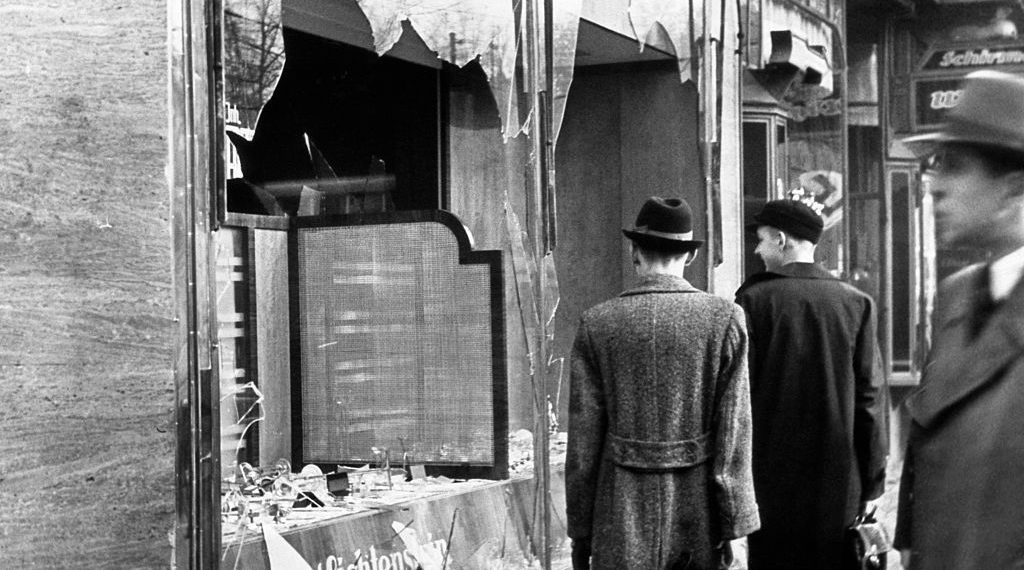According to Ari’s family folklore, the last straw was the tomatoes.
They pounded his great-grandfather, Alfred, with them as he was sweeping the Viennese streets in 1938. Crowds of Nazis jeered at him, delighting in his humiliation.
This was the last scene that families like Ari’s remember before their flight from Nazi persecution in Axis countries. Today, the 82nd anniversary of the Kristallnacht pogrom in which almost 100 Jews were murdered, 268 synagogues demolished and 7,000 businesses destroyed, many British Jews are facing a thorny post-Brexit dilemma. Countries such as Austria, Germany, Poland and Lithuania are offering citizenship to descendants of Jews who fled from or were murdered there. These days, many British Jews are struggling with whether the right to work and travel in the EU comes at the price of moral integrity.
As colleagues, we’re in the midst of a feisty collegial disagreement over this tender question. Rabbi Laura is a third-generation descendant of Lithuanian Jewish refugees, while Ari is a fourth generation descendant from Austria. The complexity of this decision is accentuated by the role of many Lithuanians and Austrians as collaborators with the Nazi regime, and their subsequent ahborrent and insufficient acknowledgement of their complicity. Austria’s genocidal actions were buried in a national state of almost-complete denial until the early 90s while it continued to benefit from stolen businesses and appropriated culture belonging to murdered Jews.
In Lithuania, because of the extensive collaboration, 91-95% of the Jewish population were murdered in the Holocaust — amongst the highest casualty rate of Jews in any country. In 1941, those in Rabbi Laura’s family who remained in Lithuania were murdered along with 2,000 other Jews in one mass grave that she visited a few years ago. The dilemma over taking Lithuanian citizenship is exacerbated by the government’s appalling record in rehabilitating Nazi collaborators as national heroes and the total parity that the government draws between the Holocaust and Stalin period. This stands in stark contrast to, for instance, Germany who has thoroughly examined its Nazi past, owned its horrors and relentlessly educated as an atonement.
We were taken aback by the number of strong responses when we asked other Jews about this on social media. Many argued, ‘of course! The citizenship should be taken’. ‘It is a birthright afforded to those who were denied the right to be born and live peacefully in the country of their ancestors’. ‘It is the righting of a historical wrong, and symbolises that we have prevailed in the face of this attack on our people’.
Others rejected those views, suggesting that those who accept citizenship are avoiding grappling with the ethical complexity of what it means to voluntarily join the political community of one’s oppressors. By accepting citizenship, they are enabling those countries to wipe their consciences and deny their culpability for their part in of the Holocaust.
There are parallels in the 1952 fierce debate in Israel over whether to accept desperately-needed reparations from Germany. Opponents saw the reparations as ‘blood money’ softening German guilt about crimes which could never be undone or justified. The offer of being monetarily compensated for the loss of lives and unspeakable trauma jarred. However, proponents pointed to the necessity of counteracting Israel’s looming economic collapse as the result of taking in millions of destitute Holocaust survivors and refugees. Reparations were accepted by the Israeli government, ‘so that the murderers do not become the heirs as well.’
The shards of shattered glass in Kristallnacht have left their scars on our post-Holocaust psyche. Our intergenerational trauma will not leave us anytime soon — but we both know that in the horrendous fragmentation of the past, we must find healing for the future, whether we take up this citizenship offer or not.
Rabbi Laura Janner-Klausner is a leadership consultant and the former Senior Rabbi to Reform Judaism
Ari Deller is a Philosophy student at Edinburgh University










Join the discussion
Join like minded readers that support our journalism by becoming a paid subscriber
To join the discussion in the comments, become a paid subscriber.
Join like minded readers that support our journalism, read unlimited articles and enjoy other subscriber-only benefits.
Subscribe